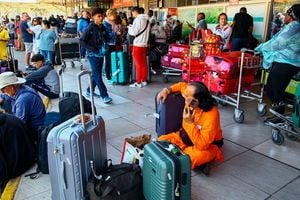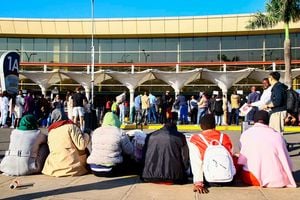
Police officers try to control protesting aviation workers at the Jomo Kenyatta International Airport on September 11, 2024.
The controversial takeover bid of Jomo Kenyatta International Airport (JKIA) by Indian conglomerate Adani Group is the latest in a growing list of big-money secret deals brokered by President William Ruto’s administration with potential dire ramifications for Kenyans.
Besides this deal, which triggered a strike by airport workers that disrupted air travel last week, another Sh127 billion power agreement with a subsidiary of Adani, Sh14 billion money printing tender, Sh16.5 billion edible oils imports and the Government-to-Government oil deal with Gulf nations whose contract documents Auditor-General Nancy Gathungu reported were withheld from her, are other opaque deals by the Kenya Kwanza administration.
There wasn’t full disclosure either on the deployment of Kenyan police officers to Haiti, with reports only indicating that the US government had pledged $100 million (Sh14.5 billion) to back the Kenyan-led multinational force.
The Adani Group, owned by the family of billionaire Gautam Adani, submitted a privately initiated investment proposal (PIIP) to the Kenya Airports Authority (KAA) earlier this year to operate JKIA under a 30-year concession.
The controversial deal, worth an estimated $2 billion (Sh257.6 billion) that Adani has committed to revamp the airport, has generated immense heat locally, leading to an 18-hour long strike by airport workers against the deal on Thursday.
The strike, which left thousands of both inbound and outbound travellers stranded, was called off following a return-to-work deal between the government and airport workers’ unions.
However, Kenya Airport Workers Union (Kawu) secretary-general Moss Ndiema insisted that the return-to-work deal did not mean that the airport workers were okaying the deal between KAA and Adani.
“We have not said that we accept Adani,” said Mr Ndiema last week at a press briefing.
Besides the sticky JKIA deal, the government has also quietly been talking with Adani Energy Solutions, a subsidiary of the Adani Group, to develop new power transmission lines and related infrastructure, including substations.
The deal is worth Sh127 billion, according to revelations by the National Treasury.
“We will start the public participation process for the Public Private Partnership (PPP) projects within the energy sector, including the one for Adani on Monday (today),” Energy and Petroleum Cabinet Secretary Opiyo Wandayi told Nation in an interview on Friday.
State House spokesperson Hussein Mohamed could not be reached for comment. He neither returned our calls nor responded to our text message.
But the Adani debacle comes even before the dust settles on the Sh16.5 billion edible oil importation scandal. Under the rushed deal, the government would import 125,000 tonnes of edible oil duty-free.
The importation was done by the state-owned Kenya National Trading Corporation (KNTC) under a credit arrangement with KCB Group. But it emerged that companies owned by influential individuals linked to the Kenya Kwanza government were single-sourced to import the oil through KNTC.
It also further emerged that top officials inflated the price of the cooking oil by $7 per litre, which negated the original guise of the government that the importation would help lower the cost of the commodity.
This is in addition to the billions of shillings in tax revenue that was foregone through the tax-free importation of the commodity.
These questionable deals, many brokered secretly and without public participation, have put the government in hot water, stoking industrial and court actions by stakeholders opposed to their implementation.
Busia Senator Okiya Omtatah says that any deals entered into by the Ruto administration are null and void without the involvement of the public.
“Article 1 of our Constitution says it all that all power belongs to the people of Kenya,” said Mr Omtatah.
“They cannot use the argument that we have no money to finance these projects. All these projects are not being done to serve the people, but to serve their own interests,” said the senator.
Mr Omtatah further likened the proposed lease of JKIA to Adani to the biblical story where Esau sold his birthright to Jacob for a bowl of soup.
“We are not selling our birthright for a bowl of soup. Even if the government forces through these deals, Adani will not access the airport and those other infrastructure,” said Mr Omtatah, adding that he is preparing for court and parliamentary action against the questionable state-backed deals, particularly those involving the Adani Group.
But Mr Wandayi, who served as the chairperson of the powerful Public Accounts Committee (PAC) in the National Assembly, said the private investment deals being entered into by the Ruto administration are critical because of Kenya’s constrained fiscal space.
“The future is PPPs (Public Private Partnership). The world has got to a stage where public finance is no longer available. We have to increasingly turn to private sector finance and we cannot afford to remain in isolation, we cannot be an island,” he said.
Another secret deal entered into by the Ruto administration is the lucrative cash printing contract handed to a German firm.
The Central Bank of Kenya (CBK) made a surprise announcement last month that it had awarded an undisclosed firm a tender to print the country’s cash to replace old notes and avert possible shortages.
So secretive was the deal that it took the intervention of Parliament for the CBK to reveal the identity of the contractor and the cost of the contract.
When he appeared before the National Assembly’s Finance and Planning Committee last month, CBK Governor Kamau Thugge said the apex bank had handed the five-year contract to Germany’s Giesecke+Devrient Currency Technologies (G+D) for Sh14.2 billion.
Dr Thugge said the currency printer, which has replaced Britain’s De La Rue, was picked through a classified procurement process.
He, however, did not disclose if there were any competing bidders for the contract and the value of the competing offers, if any.
“The classified procurement process was, therefore, necessary to avert a stock-out crisis. The procurement process was conducted in accordance with the Public Procurement and Disposal Act, and with the approval of the National Security Council and the Cabinet,” said the CBK governor.
Public finance analyst James Muraguri, who is the CEO of the Institute of Public Finance (IPF), says the government cannot claim the lack of resources as one of the reasons it is entering into some of these lopsided private deals, considering that it is spending billions on items that can be controlled.
Mr Muraguri noted that, for instance, development spending is usually one of the first lines of budget to be cut, yet bigger gains can be made from rationalising non-essential spending like travel, office furniture and airtime, as well as ridding the public sector of ghost workers.
“The national government in the FY2023/24 spent Sh573.4 billion on wages compared to Sh571.9 billion spent on development. While these figures are not significantly different, it is worth noting that in the first supplementary budget, recurrent spending was cut by just Sh34 billion while development spending was cut by Sh104 billion,” said Mr Muraguri.
“This is not ideal because only development spending can have a multiplier effect on the economy.”
The controversial government-to-government oil procurement deal from Gulf state-owned firms was also rushed in March last year.
This even as an independent consultant has revealed that Kenyans are paying an average of Sh2.70 more on a litre of fuel under the G-to-G deal compared to if the fuel was procured competitively through the Open Tender System (OTS).
Last week, Roads and Transport Cabinet Secretary Davis Chirchir, under whom the deal was brokered when he served as the Cabinet Secretary for Energy and Petroleum, was at pains to explain how the three Gulf firms were picked for the tender.
“The companies were picked through the Open Tender System. The OTS is a restricted tendering system that does not follow the public procurement process. Given the challenge that we were facing with the dollar unavailability in the country, we just subjected it (the deal) to the OTS system, which is a three-day process,” said Mr Chirchir in an interview with a local TV station.
The terms of the deal remain a mystery, with Auditor-General Nancy Gathungu earlier revealing that the Ministry of Energy and Petroleum had failed to furnish her with necessary documents for audit of the oil importation arrangements.
“Bilateral agreements governing the purchase of refined petroleum products between the government of Kenya and that of the United Arab Emirates (UAE) were not provided for audit review. In addition, the Supply Purchase Agreements (SPAs) with three oil companies supplying the products were not provided for review,” she said.
The Kenya Kwanza government has also powered through court challenges and opposition from stakeholders to deploy an initial contingent of 400 Kenyan police officers for a peacekeeping mission in Haiti in June. The mission is backed by the United Nations (UN).
The Multinational Security Support Mission in Haiti was authorised by the United Nations Security Council in October last year following widespread gang violence in the Caribbean, which rendered most of the country lawless and ungovernable.
Kenya is expected to send a total of 1,000 police officers to Haiti as part of an international force that is anticipated to reach 2,500 officers from 15 other countries.









